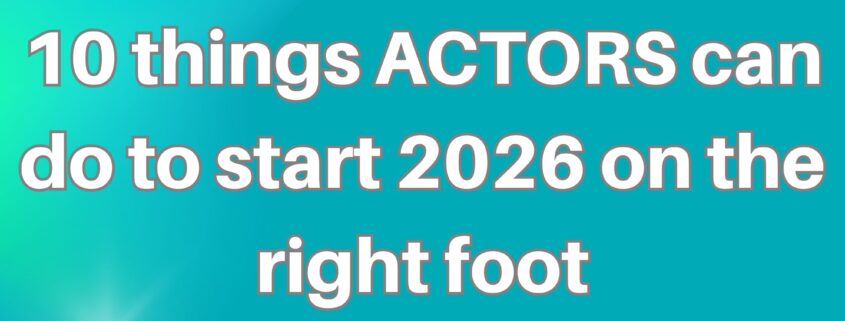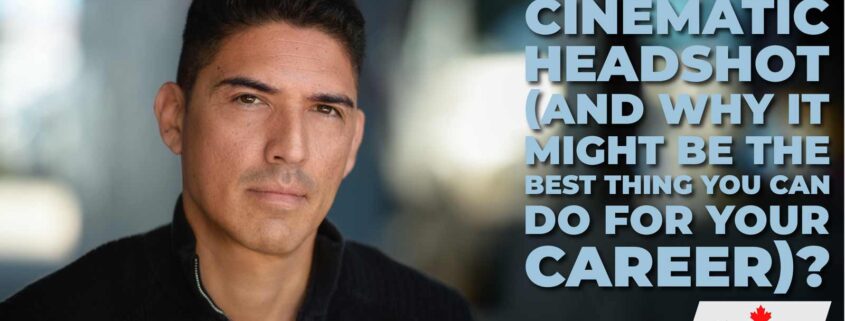10 things ACTORS can do to start 2026 on the right foot
The start of a new year is the perfect time for you to pivot your acting career from the “holiday haze” into “active work mode.” Our industry will restart the week of January 5 and quickly pick up speed this month going into Pilot Season and film festival season starting with Sundance.
Here are 10 things that you can do to start 2026 on the right foot:
1. Conduct a “Visual Audit”
Review your current headshots, demo reels, and self-tape clips. Do they still look like you? If you’ve changed your hair, lost weight, or aged into a new “bracket” over the last year, January is the time to book a new headshot or video session. Ensure your demo reels strongest 15 seconds are at the very beginning to capture casting directors’ attention quickly. You should also have all of your clips separated out and labeled accordingly. Make it easy for casting to identify you!
2. Update Your Casting Profiles
Sites like Actors Access, Casting Networks, Casting.com and IMDb are your digital storefronts.
- Check your Special Skills: Remove things you can no longer do (like gymnastics) and add new ones (like a recently mastered accent or language).
- Sync your profiles so your resume and photos are identical across all platforms.
3. Deep-Clean Your Self-Tape Space
In 2026, self-tapes are still the primary “first round” for 80–90% of auditions.
- Audit your gear: Check for frayed cables, update your lighting (softboxes or ring lights), and ensure your backdrop is wrinkle-free and neutral.
- The Goal: You should be able to go from “notification” to “filming” in under 15 minutes.
4. Create a “2026 Opportunity Map”
Don’t just wait for your agent to call. List 10–20 active TV shows or film franchises that fit your “essence” and casting type. Research who the casting directors are for those specific projects and follow their offices on social media or industry newsletters to stay informed on their current tastes. Make sure that your casting director list is up-to-date and when your budget allows, get in front of those casting directors who you are targeting to get to know them and vice versa for them to get to know your work and who you are as an actor and person.
5. Refresh Your Training
If you’ve been in the same scene study class for years, it’s time to change it up. Ask your friends who you trust for recommendations.
- Try a “Niche” Class: Look for classes in high-demand 2026 areas like Auditioning for Pilots and TV Series, 3 Week Theater Class, or On-Camera Commercial Improv.
- Cold Reading: With faster turnaround times, practicing cold reads once a week is essential for staying sharp under pressure.
6. Organize Your “Actor Admin”
Acting is a business. Spend a weekend organizing your finances:
- Collect receipts for classes, gear, and union dues for tax season.
- Create a spreadsheet to track every audition, the casting director involved, and the “vibe” of the room. This helps you spot patterns over time.
7. Read One Play or Script Per Week
Actors often spend so much time looking for work that they forget to consume the art. Set a goal to read 52 scripts this year. This builds your “tonal vocabulary”—helping you understand the difference between a procedural drama and a dark streaming comedy—which makes your choices more specific in auditions. A wonderful resource to find pilot scripts is Google TV Writing. Here you’ll find tons of pilot scripts that aired and others that did not.
8. Strengthen Your “Team” Communication
Schedule a “State of the Union” check-in with your agent or manager.
- Share your new goals for the year.
- Ask for their honest feedback on your current branding. If they think you need to update anything, do it ASAP!
- Reconfirm your boundaries (nudity, travel, stunts) so there are no surprises when a big contract or audition arrives.
9. Focus on “Instrument” Maintenance
Your body and voice are your tools.
- Daily Vocal Warm-up: Even five minutes a day keeps your resonance ready.
Physical Activity: Whether it’s yoga, stretching, hiking/walking, martial arts, or dance, choose a movement practice that helps you feel grounded and “in your body.”
10. Start Your Own Content
Don’t wait for permission to act.
- Commit to writing and filming one short scene (even just on an iPhone) every month.
- Collaborate with other actors or indie filmmakers. In an AI-shifting landscape, “human-led” original content and community networking are becoming more valuable than ever.
Tony Nation is a producer, writer, professional actor and partner at Actors Connection. Follow this link to find out more about him.











